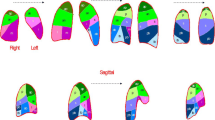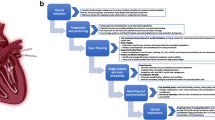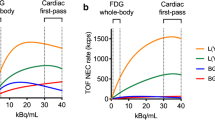Abstract
The use of multidetector CT (MDCT) represents a reality routinely used in several forensic institutes, for the numerous advantages that this diagnostic tool can provide; costs are becoming increasingly lower; data acquisition is always faster and once acquired may be revalued at any time. However, there are also some diagnostic limitations, for example, the visualization of the vascular system or a limited soft tissue contrast. In order to overcome these limitations, in recent years, contrast medium has been introduced in postmortem cases, with the development of several techniques of PMCT angiography (PMCTA) and standardized protocols to make them easily reproducible. The aim of this review is to highlight the advantages and pitfalls of PMCT and PMCTA in forensic investigation, taking into consideration the broad spectrum of applications both for natural and unnatural deaths and the numerous methods currently used. Secondly, in the light of the considerable progress in this field and the attempt to develop standardized protocols of PMCTA, the authors aim to evaluate the diagnostic value of PMCTA in comparison both to PMCT and conventional autopsy.




Similar content being viewed by others
References
Eckert WG, Garland N (1984) The history of the forensic applications in radiology. Am J Forensic Med Pathol 5:53–56
Roberts IS, Benamore RE, Benbow EW, Lee SH, Harris JN, Jackson A, Mallett S, Patankar T, Peebles C, Roobottom C, Traill ZC (2012) Post-mortem imaging as an alternative to autopsy in the diagnosis of adult deaths: a validation study. Lancet 379:136–142
Wichmann D, Obbelode F, Vogel H, Hoepker WW, Nierhaus A, Braune S, Sauter G, Pueschel K, Kluge S (2012) Virtual autopsy as an alternative to traditional medical autopsy in the intensive care unit: a prospective cohort study. Ann Intern Med 156:123–130
Krantz P, Holtås S (1983) Postmortem computed tomography in a diving fatality. J Comput Assist Tomogr 7:132–134
Grabherr S, Grimm J, Dominguez A, Vanhaebost J, Mangin P (2014) Advances in post-mortem CT-angiography. Br J Radiol 87(1036):20130488
Jackowski C, Sonnenschein M, Thali MJ, Aghayev E, von Allmen G, Yen K, Dirnhofer R, Vock P (2005) Virtopsy: postmortem minimally invasive angiography using cross section techniques—implementation and preliminary results. J Forensic Sci 50:1175–1186
Grabherr S, Gygax E, Sollberger B, Ross S, Oesterhelweg L, Bolliger S, Christe A, Djonov V, Thali MJ, Dirnhofer R (2008) Two-step postmortem angiography with a modified heart-lung machine: preliminary results. AJR Am J Roentgenol 190:345–351
Grabherr S, Doenz F, Steger B, Dirnhofer R, Dominguez A, Sollberger B, Gygax E, Rizzo E, Chevallier C, Meuli R, Mangin P (2011) Multi-phase post-mortem CT angiography: development of a standardized protocol. Int J Legal Med 125:791–802
Pomara C, Bello S, Grilli G, Guglielmi G, Turillazzi E (2014) Multi-phase postmortem CT angiography (MPMCTA): a new axillary approach suitable in fatal thromboembolism. Radiol Med. doi:10.1007/s11547-014-0467-z
Jackowski C, Bolliger S, Aghayev E, Christe A, Kilchoer T, Aebi B, Périnat T, Dirnhofer R, Thali MJ (2006) Reduction of postmortem angiography-induced tissue edema by using polyethylene glycol as a contrast agent dissolver. J Forensic Sci 51:1134–1137
Jackowski C, Persson A, Thali MJ (2008) Whole body postmortem angiography with a high viscosity contrast agent solution using polyethylene glycol as contrast agent dissolver. J Forensic Sci 53:465–468
Ross S, Spendlove D, Bolliger S, Christe A, Oesterhelweg L, Grabherr S, Thali MJ, Gygax E (2008) Postmortem whole-body CT angiography: evaluation of two contrast media solutions. AJR Am J Roentgenol 190:1380–1389
Iizuka K, Sakamoto M, Kawasaki H, Miyoshi T, Komatsuzaki A, Kikuchi S (2009) Examination of the usefulness of the contrast-enhanced Post mortem CT imaging diagnosis. Innervision 24:89–92
Sakamoto N, Senoo S, Kamimura Y, Uemura K (2009) Case report: cardiopulmonary arrest on arrival case which underwent contrast-enhanced postmortem CT. J Jap Assoc Acute Med 30:114–115
Jolibert M, Cohen F, Bartoli C, Boval C, Vidal V, Gaubert JY, Moulin G, Petit P, Bartoli JM, Leonetti G, Gorincour G (2011) Postmortem CT-angiography: feasibility of US-guided vascular access. J Radiol 92:446–449
Becker CD, Poletti PA (2005) The trauma concept: the role of MDCT in the diagnosis and management of visceral injuries. Eur Radiol 15(Suppl 4):D105–D109
Scalici E, Indorato F, Portelli F, Savì T, Maresi E, Busardò FP (2014) A fatal iatrogenic right vertebral injury after transoral odontoidectomy and posterior cervical stabilization for a type II odontoid fracture. J Forensic Leg Med 22:41–44
Busardò FP, Frati P, Carbone I, Pugnetti P, Fineschi V (2015) Iatrogenic left common iliac artery and vein perforation during lumbar discectomy: a fatal case. Forensic Sci Int 246:e7–e11
Nguyen D, Platon A, Shanmuganathan K, Mirvis SE, Becker CD, Poletti PA (2009) Evaluation of single-pass continuous whole-body 16-MDCT protocol for patients with polytrauma. AJR Am J Roentgenol 192:3–10
Ruder TD, Ketterer T, Preiss U, Bolliger M, Ross S, Gotsmy WF, Ampanozi G, Germerott T, Thali MJ, Hatch GM (2011) Suicidal knife wound to the heart: challenges in reconstructing wound channels with post-mortem CT and CT-angiography. Leg Med (Tokyo) 13:91–94
Kominato Y, Fujikura T, Hata Y, Matsui K, Takizawa H (2004) A case of postoperative hemorrhage after a hysterectomy in which a bleeding point of the left uterine artery was identified by postmortem angiography. Leg Med (Tokyo) 6:187–189
Michaud K, Grabherr S, Doenz F, Mangin P (2012) Evaluation of postmortem MDCT and MDCT-angiography for the investigation of sudden death related atherosclerotic coronary artery disease. Int J Cardiovasc Imaging 28:1807–1822
Palmiere C, Binaghi S, Doenz F, Bize P, Chevallier C, Mangin P, Grabherr S (2012) Detection of hemorrhage source: the diagnostic value of post-mortem CT-angiography. Forensic Sci Int 222:33–39
Pomara C, Bello S, Serinelli S, Fineschi V (2015) A rare and lethal case of right common carotid pseudoaneurysm following whiplash trauma. Forensic Sci Med Pathol 11:69–73
Inokuchi G, Yajima D, Hayakawa M, Motomura A, Chiba F, Torimitsu S, Makino Y, Iwase H (2014) Postmortem dynamic cerebral angiography for detecting aneurysm and bleeding sites in cases of subarachnoid hemorrhage. Forensic Sci Med Pathol 10:487–495
Aghayev E, Thali M, Jackowski C, Sonnenschein M, Yen K, Vock P, Dirnhofer R (2004) Virtopsy—fatal motor vehicle accident with head injury. J Forensic Sci 49:809–813
Ikegaya H, Yajima D, Iwase H (2008) Vertebral artery rupture in a sudden death case after mild trauma. Am J Forensic Med Pathol 29:276–278
Lardi C, Lobrinus JA, Doenz F, Fracasso T, Augsburger M, Mangin P, Grabherr S (2014) Acute aortic dissection with carotid and coronary malperfusion: from imaging to pathology. Am J Forensic Med Pathol 35:157–162
Fleischmann D, Mitchell RS, Miller DC (2008) Acute aortic syndromes: new insights from electrocardiographically gated computed tomography. Semin Thorac Cardiovasc Surg 20:340–347
Hiratzka LF, Bakris GL, Beckman JA et al (2010) Guidelines for the diagnosis and management of patients with thoracic aortic disease: executive summary. JACC 55:1509–1544
Hagan PG, Nienaber CA, Isselbacher EM et al (2000) The international registry of acute aortic dissection (IRAD): new insights into an old disease. JAMA 283:897–903
Oyama N, Oyama N, Komuro K, Nambu T, Manning WJ, Miyasaka K (2004) Computed tomography and magnetic resonance imaging of the pericardium: anatomy and pathology. Magn Reson Med Sci 3:145–152
Restrepo CS, Lemos DF, Lemos JA, Velasquez E, Diethelm L, Ovella TA, Martinez S, Carrillo J, Moncada R, Klein JS (2007) Imaging findings in cardiac tamponade with emphasis on CT. Radiographics 27:1595–1610
Ebert LC, Ampanozi G, Ruder TD, Hatch G, Thali MJ, Germerott T (2012) CT based volume measurement and estimation in cases of pericardial effusion. J Forensic Leg Med 19:126–131
Filograna L, Flach PM, Bolliger SA, Thali MJ (2014) The role of post-mortem CT (PMCT) imaging in the diagnosis of pericardial tamponade due to hemopericardium: a case report. Leg Med Tokyo 16:150–153
Filograna L, Hatch G, Ruder T, Ross SG, Bolliger SA, Thali MJ (2013) The role of post-mortem imaging in a case of sudden death due to ascending aorta aneurysm rupture. Forensic Sci Int 228:e76–e80
Huang P, Wan L, Qin Z, Zhang J, Liu N, Zou D, Chen Y (2012) Post-mortem MSCT diagnosis of acute pericardial tamponade caused by blunt trauma to the chest in a motor-vehicle collision. Rom J Leg Med 20:117–122
Shiotani S, Watanabe K, Kohno M, Ohashi N, Yamazaki K, Nakayama H (2004) Postmortem computed tomographic (PMCT) findings of pericardial effusion due to acute aortic dissection. Radiat Med 22:405–407
Bello S, Neri M, Grilli G, Pascale N, Pomara C, Riezzo I, Turillazzi E, Fineschi V (2014) Multi-phase post-mortem ct-angiography (MPMCTA) is a very significant tool to explain cardiovascular pathologies. A sudden cardiac death case. Exp Clin Cardiol 20:1419–1430
Chugh SS, Reinier K, Teodorescu C, Evanado A, Kehr E, Al Samara M, Mariani R, Gunson K, Jui J (2008) Epidemiology of sudden cardiac death: clinical and research implications. Prog Cardiovasc Dis 51:213–228
Saunders SL, Morgan B, Raj V, Robinson CE, Rutty GN (2011) Targeted post-mortem computed tomography cardiac angiography: proof of concept. Int J Legal Med 125:609–616
Roberts IS, Benamore RE, Peebles C, Roobottom C, Traill ZC (2011) Technical report: diagnosis of coronary artery disease using minimally invasive autopsy: evaluation of a novel method of post-mortem coronary CT angiography. Clin Radiol 66:645–650
Michaud K, Grabherr S, Jackowski C, Bollmann MD, Doenz F, Mangin P (2014) Postmortem imaging of sudden cardiac death. Int J Legal Med 128:127–137
Jeffery AJ (2010) The role of computed tomography in adult post-mortem examinations: an overview. Diagn Histopathol 16:546–551
O’Donnell C (2010) An image of sudden death: utility of routine post-mortem computed tomography scanning in medico-legal autopsy practice. Diagn Histopathol 16:552–555
Weustink AC, Hunink MGM, van Dijke CF, Renken NS, Krestin GP, Oosterhuis JW (2009) Minimally invasive autopsy: an alternative to conventional autopsy? Radiology 250:897–904
Oudkerk M, Stillman A, Halliburton S, Kalender W, Mohlenkamp S, McCollough C, Vliegenthart R, Shaw L, Stanford W, Taylor A, van Ooijen P, Wexler L, Raggi P (2008) Coronary artery calcium screening: current status and recommendations from the European society of cardiac radiology and North American society for cardiovascularimaging. Int J Cardiovasc Imaging 24:645–671
Sanz J, Moreno PR, Fuster V (2010) The year in atherothrombosis. J Am Coll Cardiol 55:1487–1498
Palmiere C, Lobrinus JA, Mangin P, Grabherr S (2013) Detection of coronary thrombosis after multi-phase postmortem CT-angiography. Leg Med (Tokyo) 15:12–18
Tsokos M (2005) Forensic pathology reviews, vol 3. Humana Press Inc., Totowa, p 286
Consensus-Conference (2002) College of American pathologists consensus conference XXXVI: diagnostic issues in thrombophilia. Arch Pathol Lab Med 126:1277–1433
Wood KE (2002) Major pulmonary embolism: review of a pathophysiologic approach to the golden hour of hemodynamically significant pulmonary embolism. Chest 121:877–905
White RH (2003) The epidemiology of venous thromboembolism. Circulation 107:14–18
Burke MP, Bedford P, Baber Y (2014) Can forensic pathologists diagnose pulmonary thromboembolism on postmortem computed tomography pulmonary angiography? Am J Forensic Med Pathol 35:124–131
Kikuchi K, Kawahara K, Tsuji C, Tajima Y et al (2010) Post mortem contrast-enhanced computed tomography in a case of sudden death from acute pulmonary thromboembolism. Exp Ther Med 1:503–505
Vogel B, Heinemann A, Gehl A, Hasegawa I, Höpker WW, Poodendaen C, Tzikas A, Gulbins H, Reichenspurner H, Püschel K, Vogel H (2013) Post-mortem computed tomography (PMCT) and PMCT-angiography after transvascular cardiac interventions. Arch Med Sadowej Kryminol. 63:255–266
Vogel B, Heinemann A, Tzikas A, Poodendaen C, Gulbins H, Reichenspurner H, Püschel K, Vogel H (2013) Post-mortem computed tomography (PMCT) and PMCT-angiography after cardiac surgery. Possibilities and limits. Arch Med Sadowej Kryminol 63:155–171
Sogawa N, Michiue T, Ishikawa T, Kawamoto O, Oritani S, Maeda H (2014) Postmortem volumetric CT data analysis of pulmonary air/gas content with regard to the cause of death for investigating terminal respiratory function in forensic autopsy. Forensic Sci Int 241:112–117
Maiese A, Gitto L, dell’Aquila M, Bolino G (2014) When the hidden features become evident: the usefulness of PMCT in a strangulation-related death. Leg Med (Tokyo) 16:364–366
Oshima T, Hayashida M, Ohtani M, Hashimoto M, Takahashi S, Ishiyama K, Otani T, Koga M, Sugawara M, Mimasaka S (2014) Spinal hyperostosis as an important sign indicating spine injuries on postmortem computed tomography. Leg Med (Tokyo) 16:197–200
Maiese A, Gitto L, De Matteis A, Panebianco V, Bolino G (2014) Post mortem computed tomography: useful or unnecessary in gunshot wounds deaths? Two case reports. Leg Med (Tokyo) 16:357–363
Lee WI, Lee J, Bassed R, O’Donnell C (2014) Post-mortem CT findings in a case of necrotizing cellulitis of the floor of the mouth (Ludwig angina). Forensic Sci Med Pathol 10:109–113
Lo Re G, Vernuccio F, Galfano MC, Picone D, Milone L, La Tona G, Argo A, Zerbo S, Salerno S, Procaccianti P, Midiri M, Lagalla R (2014) Role of virtopsy in the post-mortem diagnosis of drowning. Radiol Med. doi:10.1007/s11547-014-0438-4
Oshima T, Yoshikawa H, Dewa K, Ohtani M, Nakauchi K, Mimasaka S (2014) Four cases of orbital hyperdensity identified by postmortem computed tomography. Leg Med (Tokyo). doi:10.1016/j.legalmed.2014.08.001
Flach PM, Egli TC, Bolliger SA, Berger N, Ampanozi G, Thali MJ, Schweitzer W (2014) “Blind spots” in forensic autopsy: improved detection of retrobulbar hemorrhage and orbital lesions by postmortem computed tomography (PMCT). Leg Med (Tokyo) 16:274–282
Sieswerda-Hoogendoorn T, Soerdjbalie-Maikoe V, Maes A, van Rijn RR (2013) The value of post-mortem CT in neonaticide in case of severe decomposition: description of 12 cases. Forensic Sci Int 233:298–303
Schulze C, Hoppe H, Schweitzer W, Schwendener N, Grabherr S, Jackowski C (2013) Rib fractures at postmortem computed tomography (PMCT) validated against the autopsy. Forensic Sci Int 233:90–98
Noda Y, Yoshimura K, Tsuji S, Ohashi A, Kawasaki H, Kaneko K, Ikeda S, Kurokawa H, Tanigawa N (2013) Postmortem computed tomography imaging in the investigation of nontraumatic death in infants and children. Biomed Res Int 2013:327903
Daly B, Abboud S, Ali Z, Sliker C, Fowler D (2013) Comparison of whole-body post mortem 3D CT and autopsy evaluation in accidental blunt force traumatic death using the abbreviated injury scale classification. Forensic Sci Int 225:20–26
Sano R, Hirasawa S, Awata S, Kobayashi S, Shimada T, Takei H, Takahashi Y, Kominato Y (2013) Use of postmortem computed tomography to reveal acute subdural hematoma in a severely decomposed body with advanced skeletonization. Leg Med (Tokyo) 15:32–34
Makino Y, Shimofusa R, Hayakawa M, Yajima D, Inokuchi G, Motomura A, Iwase H (2013) Massive gas embolism revealed by two consecutive postmortem computed-tomography examinations. Forensic Sci Int 231:e4–e10
Ampanozi G, Schwendener N, Krauskopf A, Thali MJ, Bartsch C (2013) Incidental occult gunshot wound detected by postmortem computed tomography. Forensic Sci Med Pathol 9:68–72
Okuda T, Shiotani S, Hayakawa H, Kikuchi K, Kobayashi T, Ohno Y (2013) A case of fatal cervical discoligamentous hyperextension injury without fracture: correlation of postmortem imaging and autopsy findings. Forensic Sci Int 225:71–74
Bin Abdul Rashid SN, Krauskopf A, Vonlanthen B, Thali MJ, Ruder TD (2013) Sudden death in a case of sickle cell anemia: post-mortem computed tomography and autopsy correlation from a radiologist’s perspective. Leg Med (Tokyo) 15:213–216
Bin Abdul Rashid SN, Rahim AS, Thali MJ, Flach PM (2013) Death by ‘ice’: fatal methamphetamine intoxication of a body packer case detected by postmortem computed tomography (PMCT) and validated by autopsy. Forensic Sci Med Pathol 9:82–87
Fischer F, Grimm J, Kirchhoff C, Reiser MF, Graw M, Kirchhoff S (2012) Postmortem 24-h interval computed tomography findings on intrahepatic gas development and changes of liver parenchyma radiopacity. Forensic Sci Int 214:118–123
Høyer CB, Nielsen TS, Nagel LL, Uhrenholt L, Boel LW (2012) Investigation of a fatal airplane crash: autopsy, computed tomography, and injury pattern analysis used to determine who was steering the plane at the time of the accident. A case report. Forensic Sci Med Pathol 8:179–188
Flach PM, Ross SG, Bolliger SA, Ampanozi G, Hatch GM, Schön C, Thali MJ, Germerott T (2012) Massive systemic fat embolism detected by postmortem imaging and biopsy. J Forensic Sci 57:1376–1380
Ishida M, Gonoi W, Hagiwara K, Takazawa Y, Akahane M, Fukayama M, Ohtomo K (2011) Intravascular gas distribution in the upper abdomen of non-traumatic in-hospital death cases on postmortem computed tomography. Leg Med (Tokyo) 13:174–179
Thali YA, Bolliger SA, Hatch GM, Ampanozi G, Thali MJ, Ruder TD (2011) Death by biscuit—exhumation, post-mortem CT, and revision of the cause of death one year after interment. Leg Med (Tokyo) 13:142–144
Berens S, Ketterer T, Kneubuehl BP, Thali MJ, Ross S, Bolliger SA (2011) A case of homicidal intraoral gunshot and review of the literature Forensic. Sci Med Pathol 7:209–212
Uhrenholt L, Boel LW (2010) Contributions from forensic imaging to the investigation of upper cervical fractures. J Forensic Sci 55:1598–1602
Sochor MR, Trowbridge MJ, Boscak A, Maino JC, Maio RF (2008) Postmortem computed tomography as an adjunct to autopsy for analyzing fatal motor vehicle crash injuries: results of a pilot study. J Trauma 65:659–665
Shiotani S, Kohno M, Ohashi N, Yamazaki K, Nakayama H, Watanabe K, Oyake Y, Itai Y (2004) Non-traumatic postmortem computed tomographic (PMCT) findings of the lung. Forensic Sci Int 139:39–48
Chevallier C, Doenz F, Vaucher P, Palmiere C, Dominguez A, Binaghi S, Mangin P, Grabherr S (2013) Postmortem computed tomography angiography vs. conventional autopsy: advantages and inconveniences of each method. Int J Legal Med 127:981–989
Dirnhofer R, Jackowski C, Vock P et al (2006) VIRTOPSY: minimally invasive, imaging-guided virtual autopsy. Radiographics 26(5):1305–1333
Poulsen K, Simonsen J (2007) Computed tomography as a routine in connection with medico-legal autopsies. Forensic Sci Int 171(2–3):190–197
Flach PM, Gascho D, Schweitzer W, Ruder TD, Berger N, Ross SG, Thali MJ, Ampanozi G (2014) Imaging in forensic radiology: an illustrated guide for postmortem computed tomography technique and protocols. Forensic Sci Med Pathol 10:583–606
Bruguier C, Mosimann PJ, Vaucher P, Uské A, Doenz F, Jackowski C, Mangin P, Grabherr S (2013) Multi-phase postmortem CT angiography: recognizing technique-related artefacts and pitfalls. Int J Legal Med 127:639–652
Pomara C, Fineschi V, Scalzo G, Guglielmi G (2009) Virtopsy versus digital autopsy: virtuous autopsy. Radiol Med 114:1367–1382
Conflict of interest
The authors declare that they have no conflict of interest.
Ethical standards
This article does not contain any studies with human participants or animals performed by any of the authors.
Author information
Authors and Affiliations
Corresponding author
Rights and permissions
About this article
Cite this article
Busardò, F.P., Frati, P., Guglielmi, G. et al. Postmortem-computed tomography and postmortem-computed tomography–angiography: a focused update. Radiol med 120, 810–823 (2015). https://doi.org/10.1007/s11547-015-0559-4
Received:
Accepted:
Published:
Issue Date:
DOI: https://doi.org/10.1007/s11547-015-0559-4




